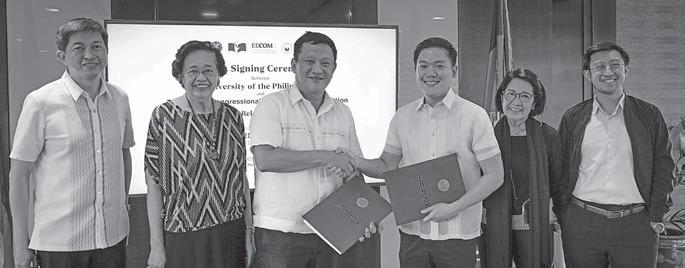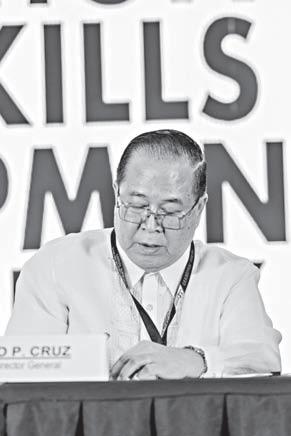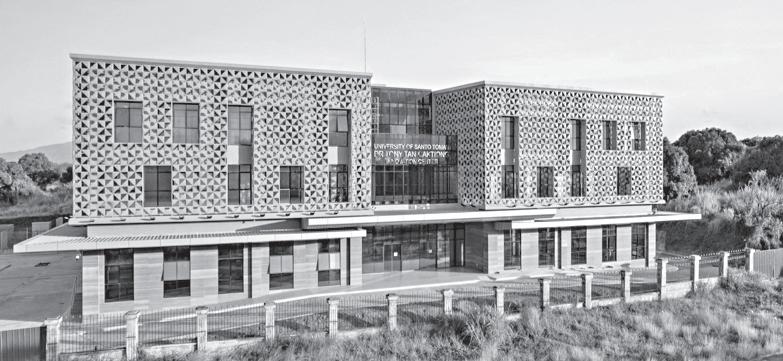
8 minute read
Mapúa lists down the best, future-proof jobs for 2023
NOW that numerous artificial intelligence (AI) applications and automation tools are in our midst, it’s unsurprising if job security and career longevity are becoming a recurring topic among employees.
Think tanks like the World Economic Forum and various government agencies have continuously urged workers to upskill, but it’s the sudden rise of AI that has motivated many to learn new skills or shift careers to stay relevant.
To help incoming college students and potential career shifters choose future-ready jobs, Mapúa University has listed down the best jobs for 2023.
Jaja C. Hernaez, Mapúa’s assistant vice president for marketing and admissions, said that Data Science, Game Development and Energy Engineering are the most promising jobs this year. Local and international employers prize these in-demand careers as they fulfill current and future skills gaps. The jobs’ flexibility, agility and scope also ensure they can address the ever-changing demands.
“With [the way work is expected to transform in the future, it is best to earn] a degree that thrives re -
ASOLEMN blessing and formal inauguration was recently held for the University of Santo Tomas-Tony Tan Caktiong Innovation Center (UST-TTCIC) at the institution’s 40-hectare campus in Santa Rosa City, Laguna.
The rites coincided with UST’s 412th foundation anniversary on April 28, 2023.
The innovation center is named after its donor Dr. Tony Tan Caktiong who is chair and founder of Jollibee Foods Corporation (JFC). He graduated from UST in 1975 with a Bachelor of Science in Chemical Engineering. He also received a doctorate in Business Administration, honoris causa , from the university in 2018.
In his message, Tan Caktiong expressed his joy over the completion and inauguration of the innovation center and its significance to the UST community, as well as to the future of the Philippines: “This state-of-the-art innovation center in the midst of the UST community is intended to champion innovation and entrepreneurship with [the aim] to benefit not only the university, but also the country and society as a whole.”
He added: “This center can serve as a catalyst for promoting innova - gardless of the change in demand, mode, and setup. Digitalization and internationalization are two major shifts that industries undergo,” said Hernaez. “The programs Mapúa offers will help produce a pool of professionals with necessary skill sets.”
As industries gear up for the Fourth Industrial Revolution (4IR), professionals should expect changes at work, such as the heavy use of technology, particularly collaborative intelligence between AI and human employees, an uptick in part-time or independent contractor requirements, and occupations that require lifelong learning. Professionals specializing in Data Science, Game Development and Energy Engineering have been trained to flourish in these scenarios.
Data Science, in particular, is deemed by industry experts as the “21st Century’s sexiest job” due to its unlimited work potential across industries. Data scientists are essential in the finance sector, as they analyze and transform information into key assets. The data boosts algorithms, upping products or processes, and guides business decisions.
Data scientists are much indemand, online learning platform
Coursera said that US-based professionals command about $90,000 to $275,500 yearly depending on experience; while the Indeed job portal stated they received P34,000 a month in the Philippines.
On the other hand, game developers take charge of the entire game development pipeline. These creative, bold, and technically-savvy gaming programmers are sought after by gaming, software and media companies for their computer programming, creative, animation, design and marketing skills. Online recruitment company JobStreet Phils. reported that the average monthly salary for game developers in the US was $115,155 a year. Those in the Philippines received P40,000 to P50,000 monthly.
As economies continue to explore various energy resources, the demand for competent energy engineers has also increased. Energy production and manufacturing companies, as well as local and national government agencies like the Department of Energy, need such professionals to develop and cascade green solutions and lead efforts for efficient energy consumption. Average salary of an energy engineer in the US is up to $93,788 per year, while it is P33,839 a month in the Philippines, according to Indeed.
Although these three professions are future-ready and financially rewarding, Hernaez cautions that students should still thoroughly evaluate their interests and competencies so that they will truly thrive and enjoy their future careers.
“In choosing a college program, it is important that they assess their capabilities and skills before selecting the best program and school where they think they can nurture and put their skillset to work,” she explained. “The three programs offered at Mapúa allow [such and enable learners to pursue careers] here or overseas, since global industries will continue to require such professionals even in the future.” foster creativity and collaboration. It will be a place for researchers, innovators and entrepreneurs to exchange ideas, share knowledge and work together toward a common goal [of] creating a better future.”
Whether students are accepted into Data Science, Game Development, Energy Engineering or any of the class-leading Mapúa undergraduate or postgraduate programs, they can be assured that they are already ahead because of the institutions’ internationally recognized academic curriculum. For more information, visit www.mapua.edu.ph.
THE University of the Philippines and the Second Congressional Commission on Education (EDCOM II) have signed a partnership to collaborate on education policy research through the UP President Edgardo J. Angara Fellowship (UPPEJA) on June 6.
Their memorandum of agreement (MOA) includes the awarding of up to 20 research-fellowship grants through UPPEJA for studies supporting EDCOM II’s priorities in governance and finance. These cover topics ranging from highimpact investments to improve learning quality, future-proofing the Filipino work force, digital transformation, decentralization and participatory governance, as well as complementarity between public and private education, among others.
The UPPEJA Fellowship aims to promote high-level policy discussions and research on a wide range of topics that address national development goals and imperatives such as science and technology, economic development, environment and climate change, good governance and communications.
It is open to all interested and qualified faculty, lecturers, professor emeriti and researchers both in the Philippines and overseas. Among the responsibilities of fellows will include presenting their research output; holding lectures, workshops and seminars; as well as engaging other scholars, policymakers and the business community to stimulate discussions on pressing national issues.
The UPPEJA Fellowship Committee is composed of UP President Atty. Angelo A. Jimenez, EDCOM 2 standing committee member and former UP president/ chancellor Dr. Emerlinda R. Roman, EDCOM II Advisory Council member Dr. Maria Cynthia Rose Bautista, Socioeconomic Planning Secretary Arsenio M. Balisacan and Sen. Juan Edgardo “Sonny” Angara who is also an EDCOM II commissioner.
Present during the signing ceremony were Jimenez, Roman, Bautista, EDCOM II executive director Dr. Karol Mark Yee,
IN today’s digital age, reliable and high-speed connectivity has become essential to effective education, as students and teachers need Internet access to engage in various online learning activities and resources.
UP vice president for Academic Affairs Dr. Leo DP. Cubillan, EDCOM II partnerships officer Jan Erik Chua, plus UP officials and administrators.
“We thank…UP for its support to EDCOM II. The revival of the UPPEJA Fellowship will significantly boost our efforts in understanding complex challenges, as well as [find]ing creative solutions related to the governance and financing of the education sector,” Dr. Yee said during the MOA signing.
He added: “We are excited and thrilled for what’s in-store for [UPPEJA Fellowship] awardees…Hopefully, we spark lively discussions and thoughtful policy recommendations from the brightest minds in the country.”
“This collaboration is UP’s response to its ideal of ‘Service to the Nation,’” Dr. Roman shared. “We do serve the nation in various ways, but doing policy studies that will hopefully improve the education system in the country will be very impactful.”
The UPPEJA fellowship was established by the UP Board of Regents on September 29, 2008 in honor of the late senator Edgardo J. Angara, who served as UP president from 1981 to 1987, and concurrent UP Diliman chancellor from 1982 to 1983.
The former lawmaker was also known for his contributions to Philippine education, as he served as the chairperson of the First Congressional Commission on Education in 1990, which was credited with a number of pioneering reforms in the education sector, including its “trifocalization,” and the “Free Higher Education Act.” ingful education and supports the development of critical digital literacy skills necessary for 21st Century success. tion that fosters connection, empathy and compassion…I am very excited to see the impact it can have on many people’s lives and well-being.”

Past awardees of the fellowship include Raul V. Fabella (2011), Raul P. Pangalangan (2011), Ramon Pedro Paterno (2011), Gerardo P. Sicat (2011), Herman Joseph Kraft (2013), Clarissa C. David (2015), Stella Luz A. Quimbo (2015), Caesar A. Saloma (2015), Lucia P. Tangi (2015), and Aileen San Pablo Baviera† (2015).
The UPPEJA Fellowship will release a call for applications within the month.
Innovation for a better future TAN CAKTIONG has always been passionate on innovation and continuous learning, evident in the way he steered JFC from a single-brand firm into one of the world’s largest restaurant companies, with 16 brands operating over 6,500 stores across 34 countries.
“I am very thrilled of how this center perfectly aligns with my ardent belief in the incessant thirst for continuous learning and dreaming big—all the more so, as the pace of change in the world is increasingly becoming more rapid,” the JFC founder remarked. “Being unable to adapt can put in question one’s relevance and render one’s knowledge, skills, and even entire businesses obsolete.”
He continued: “Innovation is not only an engine for economic growth, but also a tool for social transformation. As we build back better from the pandemic, this center is in a remarkable position to harness the power of science and entrepreneurship in developing products and processes that can promote food security and improve livelihoods, especially in… rural areas.”
Partnership for nation-building
Fr. Ang furthered: “The various laboratories, workshops, and workspaces in this building have been carefully planned to support a wide range of research and innovation activities, whether you’re a scientist working on a breakthrough discovery, an engineer developing a new technology, or an entrepreneur launching a startup. This center will provide you with resources and support our stakeholders need to succeed.”

UST held the UST-TTCIC groundbreaking ceremony in December 2020. In September 2022, UST laid down its 15-year road map for the center.
“The innovation center is a tangible manifestation of our shared commitment, common values and vision,” Tan Caktiong said of the partnership with UST. “We get an opportunity to nurture the next generation of leaders, thinkers and entrepreneurs…In so doing, we will continue to shape the future of our country.”
But many schools in underserved areas still struggle with connectivity issues. To address this challenge, Globe is supporting the Department of Education’s (DepEd) MATATAG Agenda, which aims to improve the delivery of basic education facilities and services in far-flung places in the country.
The telco firm recently donated 100 Home Prepaid WiFi units to DepEd. These were distributed to various schools in Ilocos Region and the Cordillera Administrative Region.
Globe Home Prepaid WiFi offers budget-friendly yet fast and reliable internet access. By bringing technology and the Internet closer to teachers and students, Globe is helping facilitate better and more efficient learning.
High-speed Internet connectivity allows teachers and students to access digital textbooks and multimedia learning resources, as well as engage in collaborative web-based activities. The online linkage provides students with a more comprehensive and mean -
“Globe hopes to contribute to the achievement of the MATATAG Agenda and make a positive impact on the lives of students and teachers in CAR and Region 1,” said Globe Group chief sustainability and corporate communications officer Yoly Crisanto. “We are committed to continuing…efforts to improve Internet connectivity in schools across the Philippines and provide quality education for all.”
The MATATAG Agenda has four critical components: making the curriculum relevant to produce competent and job-ready citizens, accelerating the delivery of basic education facilities and services, giving support to teachers to teach better, as well as strengthening partnerships and collaborations of the education sector with other sectors.
Globe’s involvement in the DepEd program shows its dedication to ensure that every student has an equal chance to succeed, regardless of socioeconomic status or geographical location. Through its efforts of enhancing Internet connectivity in schools, the telco helps create more chances for students to access quality education and develop critical digital literacy skills.






